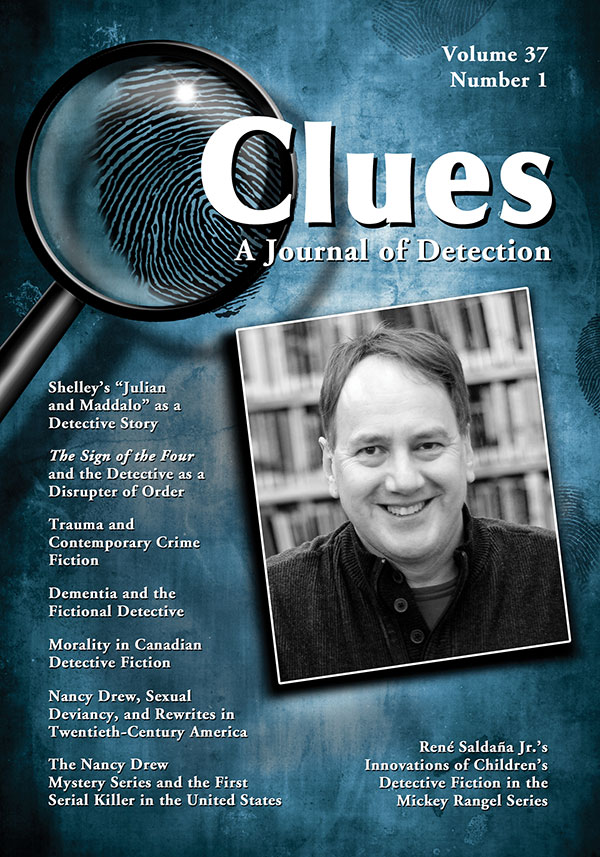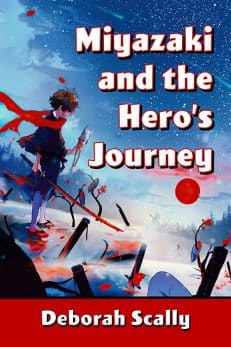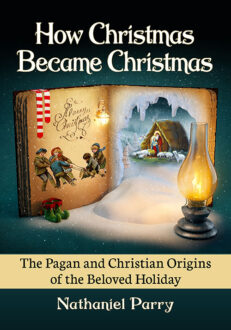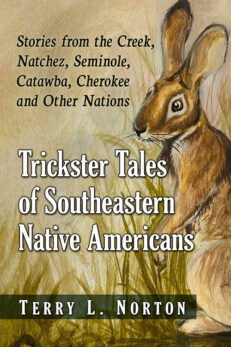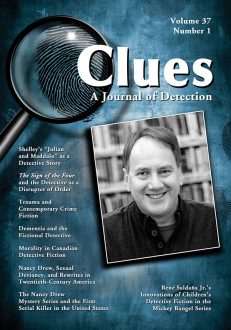Clues: A Journal of Detection, Vol. 37, No. 1 (Spring 2019)
Print Back Issue$30.00
In stock
About the Book
BACK ISSUE
This is a single back issue only. To order a current subscription, or for more information, please visit the journal’s web page at CluesJournal.com. Back issues from earlier volumes of Clues are available for order subject to availability. Also, single issues of the current volume may be ordered one at a time. Individuals may order back issues directly from our online catalog, and the charge for individuals is $30 (excluding postage). Issues from Volume 33 to the present are also available in ebook format on Kindle, Nook and Google Play. The charge for single issues for institutions is $75 per issue (excluding postage). If your institution requires a back issue, please contact us to order at the appropriate rate.
About the Author(s)
Bibliographic Details
Executive Editor Janice M. Allan
Managing Editor Elizabeth Foxwell
Consulting Editor Margaret Kinsman
Format: softcover (7 x 10), back issue
Pages: 120
Bibliographic Info:
Copyright Date: 2019
ISSN 0742-4248
Table of Contents
Introduction
Janice M. Allan 5
The executive editor of Clues discusses the Table of Contents of Clues vol. 37, no. 1, including articles on dementia in detective fiction, a Percy Bysshe Shelley poem viewed as a detective story, Wayne Arthurson, Giles Blunt, Gail Bowen, Arthur Conan Doyle, Laurie R. King, Nancy Drew, Ron Rash, René Saldaña Jr., and Peter Temple.
The Sign of the Four and the Detective as a Disrupter of Order—Nathanael T. Booth 9
Arthur Conan Doyle’s The Sign of the Four (1890) often is read in the context of British imperialism and bourgeois rationality, which stresses the problematic nature of Sherlock Holmes’s activity as a detective. Separated from its imperialist context, the novel shows a Holmes who unsettles (rather than restores) social order.
“I ain’t going to the jailhouse if I can help it”: The Thriller Impulse in Ron Rash’s One Foot in Eden—Jim Coby 19
This essay examines how the contemporary Appalachian writer Ron Rash employs the tropes of mystery thrillers—tropes largely ignored in Southern fiction—in his novel One Foot in Eden (2002), as he grapples with an increasingly urbanized Appalachia.
René Saldaña Jr.’s Innovations of Children’s Detective Fiction in the Mickey Rangel Series—Amy Cummins 30
René Saldaña Jr.’s Mickey Rangel series (Arte Público, 2009–18) both fulfills and rewrites the conventions of children’s detective fiction. On the south Texas border of the United States, fifth-grade detective Mickey solves cases while facing social problems and unanswered questions, aided by a mysterious Angel as his secret sidekick.
Trauma and Contemporary Crime Fiction—Mary Ann Gillies 40
This article explores the role of trauma in contemporary crime novels by Laurie R. King and Peter Temple. It argues that, as understandings of what constitutes trauma have shifted over the last century, crime fiction has adapted as well, representing trauma in sophisticated and complex ways and, in so doing, mirroring the contemporary preoccupation with it.
The Case of the Missing Memory: Dementia and the Fictional Detective—Marla Harris 51
This essay explores the challenges of creating a detective with dementia in Mitch Cullin’s A Slight Trick of the Mind (2005), Adele LaPlante’s Turn of Mind (2011) and Emma Healey’s Elizabeth Is Missing (2014). As these metaphysical narratives feature paradoxes of identity, they can help destigmatize this devastating condition.
“But the Cold World Shall Not Know”: A Reading of Percy Bysshe Shelley’s “Julian and Maddalo” as a Detective Story—Antoine Dechêne 61
This essay offers a reading of Percy Bysshe Shelley’s “Julian and Maddalo” as a metacognitive mystery tale that asks important questions about the possibility and reliability of knowledge when the roles of detective, criminal, and victim are gradually interwoven.
The Expressive-Collaborative Construction of Morality in Canadian Detective Fiction—Rachel Haliburton 70
This essay argues, through a brief exploration of the novels of Wayne Arthurson, Giles Blunt, and Gail Bowen, that the writers of Canadian crime fiction provide an ethical critique of the gap between Canadian self-perceptions and Canadian social realities, particularly those pertaining to First Nations peoples.
Nancy Drew, Sexual Deviancy, and Rewrites in Twentieth-Century America—Brittney Brown 81
The original Nancy Drew books, written in the 1930s, were revised in the mid-twentieth century, making dramatic changes to the titular character. The author argues that the novels were affected by changing attitudes on gender during the mid-twentieth century, which was a time when the nation returned to heteronormative values.
Taking The Hidden Staircase to the Murder Castle: The Nancy Drew Mystery Series and the First Serial Killer in the United States Michelle—Ann Abate 91
The author argues that the references to Chicago in the Nancy Drew novel The Hidden Staircase (1930) suggest a new way of interpreting the text, such as seeing links to real-life serial killer H.H. Holmes.
REVIEWS
Margalit Fox. Conan Doyle for the Defense: The True Story of a Sensational British Murder, a Quest for Justice, and the World’s Most Famous Detective Writer—Nils Clausson 105
Ken Fuller. Hardboiled Activist: The Work and Politics of Dashiell Hammett—Cynthia S. Hamilton 107
Victoria Stewart. Crime Writing in Interwar Britain: Fact and Fiction in the Golden Age—Lauren Rosales 108
Lawrence P. Jackson. Chester B. Himes: A Biography—Clare Rolens 109
Christiana Gregoriou. Crime Fiction Migration: Crossing Languages, Cultures and Media—Heather Duerre Humann 111
Marcel Danesi. Cryptographic Crimes: The Use of Cryptography in Real and Fictional Crimes—John F. Dooley 112
Clues CFP—Genre-Bending: Crime’s Hybrid Forms 115
Author Guidelines 116
Book Reviews & Awards
- “Clues is a must-have for readers and writers of crime fiction. Scholarly, thought-provoking, wide-ranging in its topics, Clues covers the crime and thriller map.”—Sara Paretsky
- “A. Conan Doyle, notoriously resentful of Sherlock Holmes’s success, liked to scorn ‘police romances’ as less significant and worthy of his talents than his other literary work. If he could have read Clues, the thinking mystery reader’s journal, he would surely have felt differently—and learned much he never realized himself about even his own landmark contribution to the genre, from which so much else by others has flowed.”—Jon Lellenberg, U.S. agent for the Arthur Conan Doyle estate
- “I love reading Clues. Every issue provides thought-provoking, well-researched articles. The variety and scope of the material found in Clues makes an unparalleled, ongoing contribution to our understanding of the role of crime fiction in our culture, and the genre’s reflection of its time and society.”—Jan Burke, Edgar-winning author of The Messenger (2009)
- “Clues is an important journal. It carries the torch of tradition that is the backbone of detective fiction. It goes below the surface and gets to the heart of what makes the genre so fascinating and valid today”—Michael Connelly, author of the Harry Bosch novels, including The Overlook (2007)
- “For erudite and fascinating truths about mysteries, follow the clues to Clues, the scholarly journal that is an essential resource for every serious student of the mystery”—Carolyn Hart, author of Death Walked In (2008)
- “With scholarship ranging from Poe to Peters, nothing beats Clues”—Joan Hess, author of Mummy Dearest (2008).

